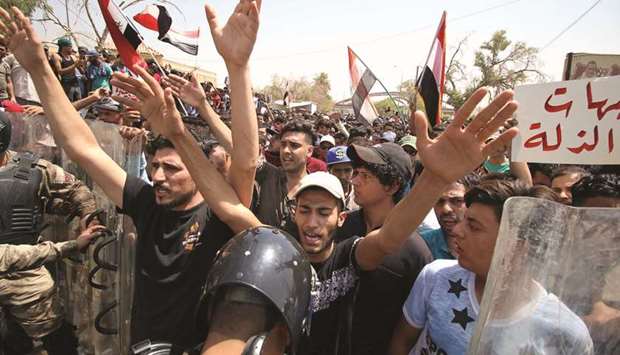The unrest is piling pressure on Prime Minister Haider al-Abadi, who hopes to serve a second term once politicians form a new government following a May 12 parliamentary election tainted by allegations of fraud.
“Hundreds of people tried to storm a courthouse. Shots were fired towards us. It was not clear who was shooting. We had no choice but to open fire,” said the police official in Samawa.
Earlier, police in oil hub Basra wounded 48 people when they fired in the air to disperse a crowd of hundreds that tried to storm a government building and demonstrated near an oil field.
Some 28 members of the security forces were also wounded, according to Major General Thamir al-Hussaini, commander of the Interior Ministry’s Rapid Response Forces.
In a town near the southern city of Amara, police shot into the air to disperse protesters after demonstrators set fire to the municipality building.
Thirteen protesters and seven policemen were wounded in the clashes. Iraq’s top cleric, Grand Ayatollah Ali al-Sistani, has expressed solidarity with protesters, saying they faced an “extreme lack of public services”. Sistani, who has millions of followers, rarely intervenes in politics, but has wide sway over public opinion.
Internet access in Iraq has been dramatically reduced.
Local officials said demonstrations have not affected crude production in Basra, whose shipments account for more than 95% of Opec producer Iraq’s state revenues. Any disruption could severely impact the country’s limping economy and push up global oil prices.
Abadi’s Dawa party has dominated Iraqi politics since the 2003 US-led invasion that toppled Saddam Hussein.
“The Dawa party has been running Iraq for 15 years and its leaders failed to live up to even a single promise they made,” said Ziad Fadhil, 38, who is unemployed, in Basra. He held up a piece of cardboard to shield his head from the scorching sun.
Earlier yesterday, Jordan’s state airline said it had suspended four weekly flights to Iraq’s holy city of Najaf due to the “security situation at its airport”. Flyudubai followed suit.
Air traffic was temporarily suspended on Friday when protesters stormed Najaf’s international airport.

